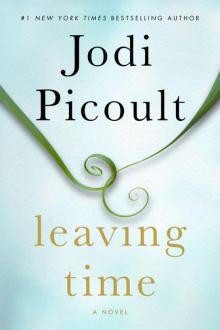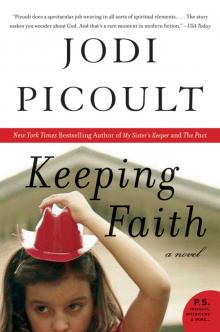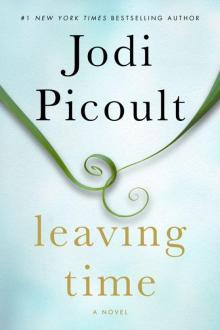- Home
- Jodi Picoult
Where There's Smoke
Where There's Smoke Read online
Where There’s Smoke is a work of fiction. Names, characters, places, and incidents either are the product of the author’s imagination or are used fictitiously. Any resemblance to actual persons, living or dead, events, or locales is entirely coincidental.
2014 Ballantine eBook Edition
Copyright © 2014 by Jodi Picoult
Excerpt of Leaving Time copyright © 2014 by Jodi Picoult.
All rights reserved.
Published in the United States by Ballantine Books, an imprint of Random House, a division of Random House LLC, a Penguin Random House Company, New York.
BALLANTINE and the HOUSE colophon are registered trademarks of Random House LLC.
This eBook contains an excerpt from the forthcoming book Leaving Time by Jodi Picoult. This excerpt has been set for this edition only and may not reflect the final content of the forthcoming edition.
eBook ISBN: 978-0-8041-8079-5
www.ballantinebooks.com
v3.1_r1
Contents
Cover
Title Page
Copyright
Where There’s Smoke
Other Books by This Author
About the Author
Excerpt from Leaving Time
SERENITY, 1993
When I was four years old, I kept telling my mother that the little boy in our house was stealing things. I should preface this by saying I was an only child—a precocious one at that. I also said I was going to live on the moon, invent glow-in-the-dark hair extensions, and marry Donny Osmond—so I understand why my mother didn’t believe me when I blamed an imaginary kid for my missing Barbie doll or the enamel snuffbox she’d inherited from her grandfather, which had up and vanished. As I recall, I may even have gotten a spanking for telling tales, when I knew damn well what I was saying was true.
Which was why, one day, when I peeked into my room and saw the boy—rifling through my bureau this time, his back to me—I tiptoed down the hall and dragged my mother to see with her own eyes.
I pointed through the open doorway at the boy. He was maybe six or seven, and he wasn’t dressed like me or any other kid I knew. He wore pants that ended at the knees and that seemed to be made out of the same black velvet as our Elvis painting in the living room; he had a lacy collar around his neck that would have gotten him teased for being a sissy if he set foot in my preschool class. “Hey,” I cried out, just as he pulled from the drawer a headband with pink daisies glued onto it, which happened to be my favorite.
His head whipped around. He looked me right in the eye. And then, when I blinked, he was gone.
“I told you so,” I said to my mother, but she wasn’t looking at the spot where the little boy had been. She was staring, wide-eyed, at me.
If this had been today, not the early seventies, I would probably have been shuttled off to a child psychiatrist and given some kick-ass medication. But my mother, who had the psychic ability God gave a sea cucumber, still was able to recognize what she had witnessed before in her own great-grandma, an Iroquois healer who had predicted the date and manner of death for every man she had ever courted. “Serenity,” she said, grasping my shoulders. “That boy’s not real.”
I just laughed at her. “He is to me,” I said.
That is how I sum up my career as a psychic. Just because you can’t see something doesn’t mean I don’t. I can’t explain it, I can’t understand it, and I can’t deny it.
So I sure as hell am not going to fight it.
I never meet the guests before the show. I have producers who make sure that they are comfortable, in greenrooms with elaborate fruit trays and a mini-fridge full of soda and fruit juice and mugs with the SERENITY! logo on the side, that they can take home as souvenirs. But I want the first interaction between us to be as undiluted as possible. This way, when I grasp the guest’s hand I get that first swirl of energy, that connection, and nothing else gets in the way.
Today, it is Bethany—the assistant to the assistant director’s assistant or some BS title like that—who knocks and sticks her head into my dressing room. She is small, mousy, and overwhelmed by everything from the line producer to the latte machine. She got this job through an uncle who’s an industry executive. When she opens the door, I can hear the buzz of the small studio audience. Unlike most talk shows, we do not just try to fill seats with the vagrants from Hollywood Boulevard. We give members of our audience Breathalyzer tests to make sure they’re sober; we do background checks. It’s the only way I could possibly do televised readings; the link to the paranormal world is all about energy, and if the energy in a studio audience is messed up because of drugs or alcohol, it’s harder for me to hear the spirits. Yet in spite of the hoops they must jump through to get in, we have a three-year waiting list of people who are dying to come to the show.
Not to mention a long list of those who are already dead.
“Sorry to interrupt, Serenity,” she says. “We’re five minutes away from filming.”
I glance at her reflection in the full-length mirror, where I am taking stock of my signature pink hair, piled onto my head (the higher the hair, the closer to Jesus), my matching shantung suit jacket, and my Louboutin spike-heeled platforms. “Bethany,” I ask. “What do you think of these shoes?”
I’m pretty sure they cost as much as her rent. “They’re epic,” she says.
“You don’t think the red on the bottom clashes?”
“No one’s going to see it,” Bethany says, blushing. She’s right about that. But I’ll know. I’ll also remember how, after my dad killed himself, my mother would have to declare Campbell’s weeks, when all we ate was canned soup, until she could get her next paycheck. I’ll remember that, and look at these shoes, and think of how fitting it is that this sixth sense I have is sometimes called a Gift.
I can feel Lucinda, one of my spirit guides, give me a psychic nudge, and I roll my eyes. “Bethany,” I say and—although I rarely do this—read unbidden. “You’re about to meet someone. He’s from Finland … Sweden … somewhere up there where it’s cold and there are herrings and stuff. It’s going to happen on a bus. When he asks you if you need help, even if you don’t—say yes.”
“I don’t take the bus,” Bethany says.
“Maybe you should,” I suggest. “And maybe between stops you can think about how it’s rude to look gift horses in the mouth.”
Bethany gapes at me. Then she swallows and backs out of the room.
Temper, child, Lucinda says. She’s a refined, elderly African-American woman.
My other guide is Desmond, a fierce, feisty gay man. I can hear him, too, laughing in the back recesses of my mind. Someone woke up on the wrong side of the broom this morning.
His thoughts immediately take me down a notch, which is—as usual—exactly what I need. He and Lucinda are my gatekeepers. I trust them to be guards, just like I pay Felix—who is roughly the size of Mount Everest—to be one here on earth. They’re psychic sentinels, so if a spirit comes up and says, I need to talk to Serenity, they can say, She’s not in. Without that, I’d have requests coming from both directions—this world and the next—24/7. I am willing to walk that dotted line between two metaphysical planes, but I need a filter. I don’t want spirits popping through walls all day long and saying, “Ooh, there’s my grandbaby, say hello for me.”
I believe everyone has spirit guides—but not everyone bothers to start a conversation with them. Spirit guides have lived as humans. They have a soul level that’s very evolved and have learned a lot of life lessons. (That’s the goal, you know—keep graduating to the next level, until you have a soul that is as pure as it can be.) Anyway, spirit guides are entrusted to help those of us on earth—not to tell us how to lead our lives, but to f
acilitate things between this world and the next. Desmond tells me all the time it’s not his job to advise me on whether or not I should do a prime-time special; he’s just here to pick me up when I’m thrown from the bucking bronco of life.
Desmond and Lucinda are the last people I speak to before I leave my dressing room to begin each show. “Let’s do this,” I challenge, the same thing I’ve said before every reading I’ve ever done—even way back when I was sitting in a tent in Old Orchard Beach, or accepting a call as a phone-in psychic on MetaphysiGals.com. Yes, now I have the second largest cable talk show in syndication; yes, now my mother lives in a bungalow not far from my own Malibu home and can eat caviar if she wants to instead of tomato soup; yes, now I am recognized on the street and asked for autographs, but really, I’m still the same girl who told a little ghost boy to stop raiding her drawers.
That’s what you think, Desmond snarks, and then it’s my cue to go onstage.
Today’s guest is a woman from California named Betsey Rycroft. Her husband, a decorated war hero in the 3rd Infantry Division, had died in Karbala, Iraq, during the initial invasion of the war. The same day, Betsey had learned that she was pregnant. Now, several months later, Betsey is in the studio with her son—Jason Junior—in her arms and a desperate wish to reconnect with her late husband. America is feeling patriotic right now, and Marcy—my executive producer—believes a military-themed show will be a ratings booster for November sweeps.
The gospel choir that serves as the musical component of the show—six phenomenal ladies we call the Psy-Chicks—begins to harmonize the theme song, which is basically my name sung over and over. The audience claps wildly. I step into the studio—which always looks so much smaller than it does on television—and do my signature backwards boogie. Then I smooth my hair and settle onto the white silk brocade couch. “Today’s guest,” I read from the teleprompter, “is a young mother whose husband, a national hero, sacrificed his life for the good of the country. Can I get everyone in this world and the next to welcome Betsey Rycroft?”
The widow looks too young to be a widow. Hell, she looks too young to be a mother. Her face makes me want to cut the crusts off a peanut butter and jelly sandwich for her, but she is here in a simple red jersey dress, holding Jason Junior. On the baby’s swaddling blanket, she has pinned her husband’s Purple Heart medal.
“Betsey,” I say, “I’m so sorry we’re meeting under these circumstances.”
Then I shake her hand.
I don’t need to touch someone to read them. I have had clients who live half a world away; I have done readings on the phone and even via email. In a way, I prefer those, because I’m not prejudging the client on the basis of what I see before my eyes.
As soon as I touch Betsey, I feel like my skin is being pelted with tiny arrows. I feel a roar of energy settling over my chest, making it hard to breathe.
That’s how I know I’ll have no problem at all contacting Betsey’s husband.
There are two types of spirits. One makes the transition to the spirit realm and goes on to whatever comes next. They can still come back to connect with people who are alive, but it’s like dropping by for a visit, and then they go back to whatever it is they were happily doing in the next life. On the other hand, earthbound spirits—ghosts—are folks who pass but still have unfinished business. They feel like they’re going to be judged for something they did wrong; or they don’t know they are dead; or they are angry about being dead and not getting to finish something. They have been cheated out of life. They stay on a plane that’s closer to the plane of earth, and that’s why they’re always at the corners of our vision and the edges of our dreams. Once they complete the process and resign themselves to the fact that their time on earth is finished and they’ve done what they can do, they can move to the next level.
I’m willing to bet that Lieutenant Jason Rycroft hasn’t strayed too far from this world.
I go through the motions: cooing over Jason Junior, asking Betsey to tell us how she met her husband, and what she hopes to get from today’s reading. All the while, I feel like I’m swimming through a sea of broken glass.
My producers have put together a reel on Rycroft. While the audience is watching, I silently summon Desmond and Lucinda. This is some weird shit, Desmond mutters, and Lucinda agrees. He won’t talk to us.
Well, but he’s there, and that’s a start. Besides, I have done readings for the families of dozens of servicemen who’ve died in the line of fire. When your life is cut short abruptly, there’s an anger that swells, a bitter appetizer to any subsequent feeling. Jason Rycroft is such a strong, furious presence that I find myself tapping my foot to keep from bursting out with the message he has for his wife.
“Betsey,” I say, “your husband is with me now.”
The Psy-Chicks sing: Hallelujah! Nooowwww!
Betsey sits up a little straighter. “Is he … how does he look?”
I can’t tell you how often I get asked this—especially from the parents of kids who die in horrific car accidents, or those who saw someone waste away from cancer. They just want to know that, in the afterlife, their loved one isn’t walking around with a steering column through his chest or still hooked up to morphine. It’s a strange question for me, because I don’t always see the spirit; I just feel the presence and hear the voice. Now, though, there is so much pressure in my eardrums I think they might burst. He’s yelling, if a spirit can yell.
Calm the fuck down, I say silently to Jason Rycroft. Tell her something so she knows it’s you.
Usually when spirits come to connect with a loved one, they try to give me a picture of a memory they both have, as if to say, See, I’m still me and I’m real. (Because honestly, isn’t that what we all want? To be real to someone?) They’ll show me a roach and say, It popped out of the sink once, and my wife nearly peed her pants. Or they’ll ask why she didn’t wear the red jeans that make her butt look so sweet. Sometimes a spirit has a negative message: Why are you fucking your life up with drugs? Why are you with a guy who doesn’t treat you well? But when people are hurting bad, whatever comes through me for them—however that connection happens—is positive.
“Does he know we have a son?” Betsey asks shyly.
I should be there.
The words are steeped with pain, so heavy that they fall like stones in my mind. It’s a thought I didn’t have, that has landed on the tip of my tongue all the same. That’s what hearing a spirit feels like: an involuntary reflux. A hiccup. It’s just there, and you can’t make it go away.
“He says he should be here.”
“I wish he was,” Betsey replies. There are tears in her eyes. I don’t have to look at Marcy dancing in the wings to know that this is ratings gold. “How do I tell him I love him?” she asks.
“You just did,” I say.
I wait to see if I hear it back. I know that’s what Betsey’s waiting for. But sometimes, a client says “I love you” and I don’t hear a response. If that’s the case, I don’t lie.
Looks like Jason isn’t the type to express his feelings on national TV. He doesn’t say he loves his wife. He doesn’t say anything at all. Instead, those pricks of heat against my skin intensify, as if I’m being pelted. My throat is so scratchy that I can hardly breathe. I blink, and when I open my eyes, I see a tornado made of sand.
This is how I died.
“Your husband wants you to know how he passed away,” I repeat. “I think there was sand?”
All of a sudden I see a flash of lightning and hear thunder.
“A sandstorm,” I correct.
“Yes … there was a battle during a sandstorm. The army told me he saved his whole platoon by holding off rebel fighters.” Betsey fingers the Purple Heart pinned to her baby’s blanket.
Jason isn’t speaking to me anymore. He’s madder than a one-legged lady at an IHOP, and he’s bombarding me with images: a desert dry as bone, sand whipping in a cyclone around him. The shouts and screams of soldier
s, who are barely visible in their camouflage, as the storm rages. The sight of the enemy, getting not closer but more distant. The hoarse message, ripped from his own throat, that the Iraqis are retreating. The gun barrel that suddenly glinted in front of him. The blood that bloomed on his chest, and the pain of his arm being ripped away. The man who leaned over him; the strip of fabric on his uniform that read FERREIRA.
I don’t realize I’ve said that last bit out loud until Betsey interrupts. “Captain Ferreira?” she repeats. “That was Jason’s CO. He carried Jason’s body back to safety. He wrote me a letter and told me how Jason had died a hero.”
LIAR.
I learned a long time ago not to edit the material I’ve been given, and I’m not accountable for the reaction it causes. “Your husband wants you to know that Captain Ferreira is a liar,” I say flatly.
Understandably, Betsey looks confused. So am I. In my mind Jason is throwing up images of his bleeding chest, and Ferreira’s name tag, and a rifle. Over and over.
You stupid bitch, I hear.
I am trying to decide if this is a message for me or for Betsey when something so different pops into my head—and onto my taste buds—that I freeze in place. If my senses are right, Jason Rycroft is trying to get me to think of a Fribble.
“Am I getting this right? Do Fribbles mean something to you?” I ask Betsey.
“Fribbles? Like the milk shake they have at Friendly’s?”
“Exactly …”
She bites her lip. “I don’t even eat ice cream,” she says. “I’m lactose intolerant.…”
Just then, a light in the studio blows and the glove of one of the grips goes up in flames.
Alarms go off. Someone grabs a fire extinguisher and sprays the grip, who has dropped his equipment and is rolling on the floor, shrieking in pain. People in the studio audience start screaming, and the baby wakes up and does the same. The Psy-Chicks kick off their heels and run. Marcy races onstage to shepherd Betsey to safety as Bethany appears out of nowhere and grabs my arm, trying to drag me along with them.

 Small Great Things
Small Great Things Leaving Time
Leaving Time Nineteen Minutes
Nineteen Minutes Larger Than Life
Larger Than Life Perfect Match
Perfect Match My Sister's Keeper
My Sister's Keeper The Pact
The Pact Handle With Care
Handle With Care Songs of the Humpback Whale
Songs of the Humpback Whale Mermaid
Mermaid The Tenth Circle
The Tenth Circle The Color War
The Color War Leaving Home: Short Pieces
Leaving Home: Short Pieces House Rules
House Rules Lone Wolf
Lone Wolf The Storyteller
The Storyteller The Book of Two Ways
The Book of Two Ways Shine
Shine Off the Page
Off the Page Sing You Home
Sing You Home Second Glance: A Novel
Second Glance: A Novel Mercy
Mercy Vanishing Acts
Vanishing Acts Between the Lines
Between the Lines Plain Truth
Plain Truth Salem Falls
Salem Falls Keeping Faith
Keeping Faith Harvesting the Heart
Harvesting the Heart Change of Heart
Change of Heart Where There's Smoke
Where There's Smoke Leaving Time: A Novel
Leaving Time: A Novel Over the Moon
Over the Moon House Rules: A Novel
House Rules: A Novel The Jodi Picoult Collection #2
The Jodi Picoult Collection #2 Leaving Home: Short Pieces (Kindle Single)
Leaving Home: Short Pieces (Kindle Single) My Sister's Keeper: A Novel
My Sister's Keeper: A Novel![Mermaid [Kindle in Motion] (Kindle Single) Read online](http://i1.bookreadfree.com/i1/04/03/mermaid_kindle_in_motion_kindle_single_preview.jpg) Mermaid [Kindle in Motion] (Kindle Single)
Mermaid [Kindle in Motion] (Kindle Single) The Jodi Picoult Collection #4
The Jodi Picoult Collection #4 Sing You Home: A Novel
Sing You Home: A Novel The Jodi Picoult Collection
The Jodi Picoult Collection Lone Wolf A Novel
Lone Wolf A Novel Second Glance
Second Glance Larger Than Life (Novella)
Larger Than Life (Novella) The Jodi Picoult Collection #3
The Jodi Picoult Collection #3